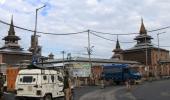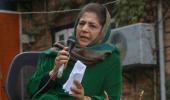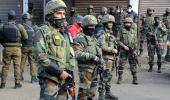All old signposts have been uprooted and milestones bulldozed.
New ones have yet to emerge.
The old order stands degraded in the new landscape whose contours are indistinct, observes Mohammad Sayeed Malik, the distinguished commentator on Kashmir affairs.

Post-August 5, 2019, the political playfield in Kashmir has so drastically changed that the main local players find its tricky new contours too hazardous to negotiate.
That explains their unusual hesitation/reservation and confusion until formulating a cohesive positive response to Prime Minister Narendra Modi's rather sudden invitation for apparently open-ended talks, but practically for forging a workable formulation to extricate the Union Territory from imposed political comatose.
Their dilemma is genuine. All old signposts have been uprooted and milestones bulldozed.
New ones have yet to emerge. The old order stands degraded in the new landscape whose contours are indistinct, to say the least.
This is causing acute discomfiture to the principal mainstream players of Kashmir's tricky power politics.
Uncertainty is looking them right into their faces; not only in general political terms, but also their potential prospects in the power game.
As it is, the 'Gupkar Alliance' has come to be recognised as the public face of the 'dispossessed' local politicians.
Some of its original constituents have since migrated and occupied firmer perches on the right side of New Delhi.
Two main props of the Gupkar Alliance -- the National Conference led by Farooq Abdullah and the Peoples Democratic Party headed by Mehbooba Mufti -- are its public face.
Looking from a closer angle, the NC and the PDP are not known to be evenly harmonised across the board.
NC has three members in the Lok Sabha, the PDP till recently was left with two Rajya Sabha members (since retired) who, after August 5, 2019, had shifted their loyalty and gifted their unannounced but thinly disguised support to the NDA in New Delhi.
The third element in the local power politics, Congress, is not a part of the Gupkar Alliance but largely shares its pro-autonomy sentiment vis a vis the NDA government in New Delhi.
The elections held last year to district development boards and other civic bodies produced a discomfiting outcome for the NDA and yielded a god-send political bonanza for the Gupkar Alliance.
The outcome infused new life into what otherwise was beginning to look like a tired and exhausted political force.
Suddenly, it cast a long shadow over the scene, more visibly in the Kashmir Valley that continues to remain the crucial battleground.
That gifted outcome convinced the Gupkar Alliance that, after all, it was not all over for them after abrogation of Article 370 and Article 35A and the downgrading and bifurcation of the J&K state.
The Alliance has been breathing more perceptibly and demonstrating that it was far from running out of steam.
It refuses to be written off, as was erroneously sought to be believed last year during the district development council polls.
The outcome dictated that the entity was worth a deal, good, bad or indifferent.
Conversely, the civic poll outcome came as a serious setback to the NDA as its disproportionately inflated campaigning failed to cut ice in the Valley despite propping up proxies from one end to the other.
The options to proceed were narrowed down. It is safe to guess that the NDA in New Delhi felt compelled to reassess and take a more realistic view of the local ground situation.
The Gupkar Alliance had, otherwise, been sought to be cornered out of the arena to make way for some pliant political superstructure.
Until the poll results were out, no stone had been left unturned to see the back of the Alliance partners from the arena; and for good.
The invitation to the Gupkar Alliance is substantially, if not wholly, a byproduct of that after-thought.
Besides, the public opinion in the country and beyond needed to be reassured that 'normalcy' in Kashmir was actually the work-in-progress.
However, the problem is that the local players in the national mainstream -- notably, the NC, PDP and the Congress -- also do not have many options to choose from.
The mood in the Valley is heavily loaded in favour of restoration of the pre-August 5, 2019 Constitutional position.
The reality is that any such proposition is not even conceivable at this point in time. Looking from that angle, the mainstream parties have more than an uphill task ahead.
The scope and declared agenda of the all-party meeting in New Delhi leaves no room for accommodating the expectation of Valley-based mainstream parties.
Also, total alienation from the party in power at the Centre is not an option for them, going by past experience.
Certain levels of visible engagement is inevitable, irrespective of the colour or creed of the regime at the helm.
Immediately, this dilemma confronts the NC and PDP more than anyone else because the ground support it received in the civic poll suggests that their political strength actually comes from the constituency which is yet to digest the hard reality and make its choice between none-too-palatable options.
Beyond that, the line strays across the basic ideological divide inherent in the issue of the state's accession.
The NC and PDP would have to think a hundred times before even thinking of crossing that Laxman Rekha.
From that angle, the New Delhi meeting is most likely to add to the burden of the local mainstream parties than lightEning it in any manner. Practically, it could be back-to-the-wall situation for them.
Insiders say it was not that easy of the Gupkar Alliance to forge common ground on the issue of a collective response to the invitation for New Delhi meeting.
Having taken the plunge, they would need all the good luck to take the next logical step -- accepting the fait accompli, rather than pursuing the unrealistic restoration of Article 370 and Article 35A.
Feature Presentation: Aslam Hunani/Rediff.com










